#REcycling
Explore tagged Tumblr posts
Text
it has come to my attention some people don't donate their clothes????
DONATE YOUR FUCKING CLOTHES
it doesn't matter if you give them to a local shelter, a thrift shop, dropbox at a church or next to a dollar store, give them directly to a homeless person or to other family/friends that would fit them, any of these are very accessible options and it SHOCKS me that some people just throw away the clothes they don't fit/want anymore. what the FUCK.
and the thing about donating your old clothes is that it also doesn't matter if you're rich or middle class or poor or even homeless, if you have extra clothes you no can no longer fit or no longer need, you donate them.
i don’t know what you upper-middle class fuckers are up to 😭 there's a whole system we got going on here where you get your new clothes THAT YOU NEED from local thrift shops or dropboxes, wear those clothes as long as you can, and then when you cannot fit them or have excess clothes to get rid of, you donate them for the next round of people that need them. don't tell me poor people are the only ones who know how to do shit responsibly???
and i would like to emphasise childrens clothes are a MUST donate. adults' bodies will change and may not always fit the same clothes, but childrens clothes especially do not last and cannot be wasted. please. fucking. donate. your. child's. outgrown. clothes.
small children's clothes are a very big need for lower class people because unlike being a teen or adult, where you can modify your stuff, there is literally nothing else for small kids to wear. babies and toddlers and elementary kids NEED clothes, and babies and toddler and elementary kids' clothes do not last their lifetime. it is SUCH A SIMPLE SOLUTION.
[not to say everyone should necessarily get kids' clothes from donations - if you're upper class and have the money to buy new kids clothes, that's okay, and honestly probably better with the current state of consumerism because it's the lower class people that need the donations.]
hell the clothing dropbox at my therapy office is my main source of clothes (both getting and giving) and nearly all of it is just large men's pants.
please consider that there are people of all ages and sizes out there that need clothes, i honestly think that should be an obligation for EVERYONE. thank you for listening and please stay sustainable.
#the only exception is the salvation army#please do not donate your stuff to the salvation army as they do not give it away they sell it at high prices to poor people#and they are a really fucking bad organisation#but any regular temples/churches/mosques are fine i have nothing against religion#and you don't have to support the religion to donate clothing anways cuz for the most part its given away to anyome who needs it#leftism#sustainability#fashion#fast fashion#recycling#upcycling#secondhand#ethics#donations#lower class#working class#classism#poverty#sustainable fashion#sustainable living#ethical clothing#clothes#clothing#donate if you can#support#anarchism#enviromentalism#consumerism#anti consumerism#thrifting
233 notes
·
View notes
Text
Rice University researchers have developed an innovative solution to a pressing environmental challenge: removing and destroying per- and polyfluoroalkyl substances (PFAS), commonly called "forever chemicals." A study led by James Tour, the T.T. and W.F. Chao Professor of Chemistry and professor of materials science and nanoengineering, and graduate student Phelecia Scotland unveils a method that not only eliminates PFAS from water systems but also transforms waste into high-value graphene, offering a cost-effective and sustainable approach to environmental remediation. This research was published March 31 in Nature Water.
Continue Reading.
#Science#Environment#Chemistry#Materials Science#Recycling#PFAS#Per- and Polyfluoroalkyl Substances#Graphene
155 notes
·
View notes
Text
The amount of leftists who can't tell the difference between
"You should recycle, but it's not going to stop impeding climate doom"
and
"You shouldn't recycle because it's not your fault the planet is imploding"
is baffling. Like, you're allowed to be mad about greenwashing while still trying to live as sustainably as possible. Buying glassware instead of plasticware isn't gonna stop the planet from falling apart, but it's certainly better than saying "ah fuck it" and supporting the production and landfilling of plastic waste. Even if it's just by a tiny, individual's amount, it's still better than doing nothing. This "all or nothing" mentality that these people claim is tearing apart American politics is quite literally at the heart of their entire belief system.
#6/29/23#rambles#politics#american politics#global warming#climate change#recycling#sustainability#rant
1K notes
·
View notes
Text





recycling label printables are now in my ko-fi shop
this is just v1; I'd like to simplify them so they read better at smaller sizes/from a distance, make full color versions, and possibly add other materials and instructions. if you have any suggestions/requests, please let me know!
77 notes
·
View notes
Text
Btw, if a disabled or mentally ill person (or honestly just anyone who’s really burnt out and exhausted with life, such as caregivers) tells you that they have to use disposables to clean and function in their day to day life, and your response is anything remotely like “well you’re a horrible person because that plastic you just used is killing the planet” I need you to know that you are ableist, classist, and just a shitty person, and I hate you.
Yes, I know that using paper towels and Clorox wipes is not as sustainable or healthy for the ecosystem as just using regular towels and rags. However, I am fucking exhausted all the time, and if I use regular rags, I will not have the energy to clean them. They will sit in my kitchen and get moldy and have to be thrown away anyway. And then my family is living in unsafe conditions because we’re breathing mold spores.
Additionally, we are fucking poor. We don’t have a washer and dryer. If I want to do laundry I have to load it all up in my car, drive across town to the only laundromat, spend most of my day switching things over and waiting for machines to open up, spend about thirty bucks (probably more, because the dryers are shit and never actually dry things on the first cycle), load everything back into the car, drive back home, and then sort and fold and put away everything I just washed.
That is not feasible most of the time, because I am disabled, I don’t have that money to spend, and I am the primary caregiver for our baby who has extreme sensitivities to changes in our routine. I can’t just take him to the laundromat with me, and I don’t have anyone to watch him while I go. Most days I’m not physically capable of carrying baskets of laundry to and from my vehicle. And again, we can not afford the laundromat. Anything that I can do to reduce the amount of laundry we need to wash in a month, I’m going to do.
All of this to say, please for the love of god consider that there are literally thousands of reasons someone might not be doing “clean living” or choosing the most eco-friendly option all the time. We can’t all cut out disposables. I already feel guilty enough that I can’t just function like a normal person, you do not need to butt in and make it worse.
If your activism for the environment and the earth goes so far as to make you apathetic to the struggles and needs of the real actual people around you, you need to reconsider where your morals lie.
(It’s also worth noting that every regular person on the planet together does not generate ANYWHERE NEAR the amount of plastic and toxic waste in a year that mega corporations do in a matter of weeks or months. I’m not saying that the average man doesn’t need to make as many good and healthy choices as they are able, but seriously, most of us are not the real issue here. Go fight the logging and fracking companies killing the ecosystem. Go attack the capitalist mega-corps like Walmart and Amazon and Disney and Apple that discard so much plastic they are almost single-handedly killing the oceans themselves.)
#ableism#classism#ecofriendly#global warming#environmetalists#disability#plastic waste#recycling#things that fucking matter#burnout#mentally tired#mentalheathawareness#chronically ill#text post#nightramblestm
148 notes
·
View notes
Text
A company making wooden wind turbine blades has successfully tested a 50-meter-long prototype that’s set to debut soon in the Indian and European markets.
Last year, the German firm Voodin successfully demonstrated that their laminated-veneer timber blades could be fabricated, adapted, and installed at a lower cost than existing blades, while maintaining performance.
Now, Voodin has announced a partnership with the Indian wind company Senvion to supply its 4.2-megawatt turbines with these wooden blades for another trial run.
Wind power has accumulated more than a few demerit points for several shortfalls in the overall industry of this fossil-fuel alternative.
Some of these, such as the impact on bird life, are justified, but none more so than the fact that the turbine blades are impossible or nearly impossible to recycle, and that they need to be changed every 25 years.
Wind turbine blades are made from a mixture of glass and carbon fiber heated together with sticky epoxy resin, and these materials can’t be separated once combined, which means they go into landfills or are incinerated when they become too battered to safely operate.
GNN has reported that folks will occasionally find second-life value in these giant panels, for example in Denmark where they are turned into bike shelters. In another instance, they’re being used as pedestrian bridges.
But there are way more wind turbine blades being made every year than pedestrian bridges and bike shelters, making the overall environmental impact of wind power not all green.
“At the end of their lifecycle, most blades are buried in the ground or incinerated. This means that—at this pace—we will end up with 50 million tonnes of blade material waste by 2050,” Voodin Blade Technology’s CEO. Mr. Siekmann said recently. “With our solution, we want to help green energy truly become as green as possible.”
The last 15 years have seen rapid growth in another industry called mass timber. This state-of-the-art manufacturing technique sees panels of lumber heat-pressed, cross-laminated, and glued into a finished product that’s being used to make skyscrapers, airports, and more.
At the end of the day though, mass timber products are still wood, and can be recycled in a variety of ways.
“The blades are not only an innovative technological advancement but a significant leap toward sustainable wind production,” said Siekmann, adding that this isn’t a case of pay more to waste less; the blades cost around 20% less than carbon fiber.
Additionally, the added flexibility of wooden blades should allow for taller towers and longer blades, potentially boosting the output of turbine by accessing higher wind speeds.
Now partnered with Voodin, Senvion will begin feasibility analysis in the next few months, before official testing begins around 2027.
#good news#wind turbines#wind power#environmentalism#science#environment#fossil fuel alternatives#mass timber#recycling
9K notes
·
View notes
Text
Making a bag from a broken umbrella
A few years ago I saw a broken but cool umbrella on the side of the road. (The Welsh climate kills tens of thousands of umbrellas every month, it's very sad.) Someone had hand-stamped yellow bees onto a black umbrella and it looked badass. I rescued it with the intent to turn it into something cool, and recently I got around to it and succeeded:


It's a super-lightweight, fast-drying, very strong shopping bag. Umbrella fabric is perfect for this. The only part that didn't get used is the very tip of the umbrella, and there was enough fabric for TWO bags.
It was pretty easy and fun, so here I am to show you how I did it.
You will need:
Sewing machine (though you could do it by hand)
Broken umbrella with intact fabric
Stitch ripper, or tiny scissors, or big scissors and good fine motor control
Reel thread and bobbin thread that you think looks nice with the umbrella fabric
Pins
Set square
Tailor's chalk
Wide drawstring band type stuff for handles - about a metre? (Or you can make something from random fabric in your stash.)
Scissors
The chalk and ruler and stuff are pretty optional if you are happy to just eyeball it and hope for the best.
How to do it:
The bag bit
Remove the fabric from the umbrella frame. Take your stitch ripper or scissors and very carefully snip the stitches at the point of each umbrella spoke. You will then find that there is probably another set of stitches around halfway up each spoke, so cut those too. Then cut the fabric around the tip of the umbrella, because it's probably attached very securely.
Then fling the umbrella frame into a bin and never think about it again, or turn it into a cool spider sculpture.
Carefully remove the velcro fastening strap. We will need it later, so keep it all in one piece - use the stitch ripper or tiny scissors.
Cut the umbrella fabric in half. The umbrella will have an even number of segments, probably eight. It's tempting to cut it along a seam, but if it has eight segments it'll work better if you cut it along the middle of the opposite panels, like so:
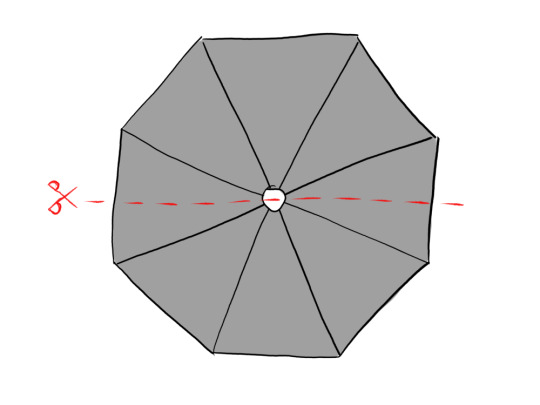
Fold your semi-circle in half with the seams on the outside (right sides together), like this:
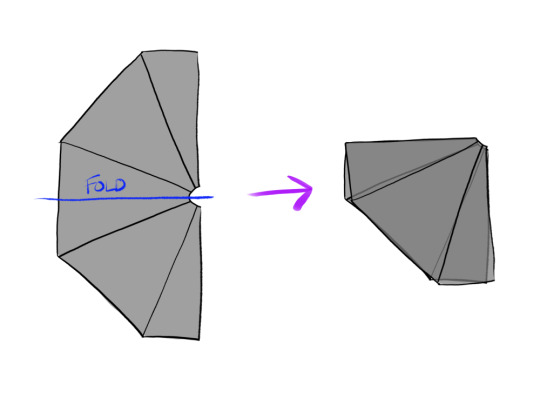
Roll-and-pin and sew the open side - this one:

Edit: I had someone ask me what roll-and-pin means, so I asked my sewing friend if it was obvious what I meant by it, and they said they were not sure! So, this is what I mean:

You fold in the edge, and then fold it in again, to make a little roll.
Then when you sew along the middle of the roll it catches and traps the raw edges. That way it can't fray or unravel.
Pinning this way (perpendicular to the edge instead of parallel to the edge) makes it easier to sew with a sewing machine because you're a bit less likely to bang your sewing machine needle into a pin. However, do take them out just before the needle gets there, or at least go slowly over the pins, if you can.
Trim the bottom off. How much you trim off will depend on how big your starting umbrella is and what shape you want your bag to be, but maybe 10cm or so?
Make a mark about 10cm from the bottom along one of the pre-existing seams.
Use a ruler (or a piece of string or whatever) to measure the distance along the pre-existing seam from the top corner to the mark.
Measure the same distance along the other seam from the other top corner, make another chalk mark.
Draw a line across the whole width of the quarter with the ruler, joining the marks. This should make the chalk line parallel with the top flat edge.
Make another line about 2cm below it, and then cut along the bottom line.
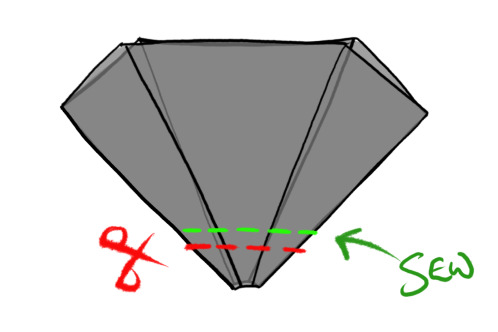
Then roll-and-pin and sew along the remaining chalk line.
Sew the side seams. Mark them on using the set square and the chalk, and then pin them and sew. Make the sides square with the top edge.
These triangles on the sides are going to become inside pockets, so also sew a square line along the bottom. That'll stop tiny things from getting stuck in the point of the triangle.

Sew the top edge of one pocket to the side of the bag. The bag is inside out at this point, so when you sew the pocket to the "outside" (wrong side) it'll end up inside the bag when you turn it right-side-out at the end.

I recommend pins for positioning the pocket. The stitches will show on the outside of the bag, so bear this in mind when choosing your thread. Try and keep everything nice and flat so there's no bunching; the triangle should fold over exactly on the vertical stitches along the side and then the pocket should lay flat against the side of the bag. Be careful to only sew through one side of the bag, and only through the adjacent side of the pocket.
Flip the bag over, and do the same on the other side.

The top left and right corners can be pretty weak because the ends of several seams meet there, so...
Roll the top over outwards and hem. That's wrong-sides-together.
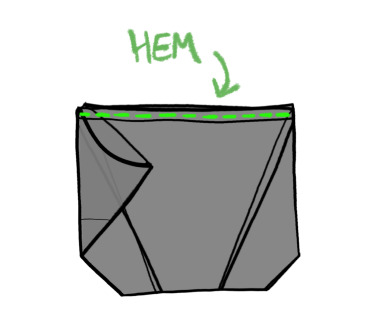
That's the bag part finished!
Handles
Grab your wide drawstring fabric tape stuff. (Or, cut a really long rectangle 6-8cm wide, sew along the long open edge so it makes a tube that is open at both ends, and then turn the whole tube inside out so that the seam is on the inside.)
Choose how long your handles will be. This is a very personal choice. Do you want to carry it on your shoulder, or in your hand?
Or... both, like this Ikea bag??

It can help to pin them onto the bag to get a feel for what it'd be like to hold. Here's what we're approximately going for, with your bag inside out:
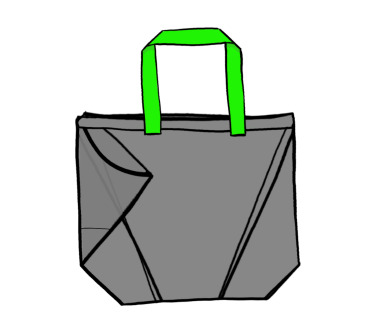
Add 3cm to the length of one handle, cut it, and then cut the second to match the length before you sew anything on.
The extra 3cm is because you're going to fold over 1.5cm at each end when you attach it, to stop it unravelling.
Pin one end of one handle. The bag should still be inside out, i.e. the "wrong side" is still facing outwards. First fold 1.5cm at the end of your handle, and then attach it about a third of the way along one side of the bag, on the wrong side. The 1.5cm flap should be tucked underneath itself, between the handle and the bag.
I often have to use two pins to keep the handle really square with the top edge.
Measure how far it is from the side seam, and pin the other end of the handle the same distance from the other side seam, being careful not to twist the tape.
Sew the handle to the bag. Start with a square, remove the pins without lifting the sewing machine foot or breaking the thread, and then sew a cross through the middle of the square. Sew over some stitches you've already done and then reverse over them, to make it really secure.
See how sewing the handle down secures and tightens the loose woven ends of the handle stuff:

Do the same on the other side of the bag with the other handle tape.
Fastening
Turn your bag right-side-out. Lay it flat and then fold it up the way you kind of instinctively want to when you're trying to pack it away really small.
Grab your little velcro fastening strap from earlier and play around to find a good place to put it. The back of the soft side of the velcro will get sewn onto the bag.
Grab your tailor's chalk and draw an arrow where the stitched-down end of the velcro is going to go, with the arrow pointing in the direction that the tape will be lying when you unfold it.
Flatten out your bag again, and pin the back of the soft end of the fastening strap down onto your arrow, with the flappy end lying in the direction of the arrow. Again, you may need to use two pins to keep it square. Make sure you only put the pins through one layer of bag fabric.
Use the same technique as you used with the handles to sew the fastening strap down.
YOU ARE NOW DONE.

Lay it down and roll it up and fasten it a few times and bask in smugness. You earned that dopamine, and you should enjoy it. Fill it with tins to test the strength and marvel at your handiwork.
You can also make a second bag with the other half of umbrella, if you're into that. It will be exactly the same, but without the little velcro fastening strap.
Optional:
Reblog with a photo of your new umbrella bag. :D
69 notes
·
View notes
Photo

The 7 R’s of Sustainability:
Did you know that ‘recycling’ is step 6 of the 7 Rs of sustainability? The other R’s are just as important even if they are often forgotten.
Rethink- Do I really need to buy this? The point of this step is to stop and think.
Refuse- Does this product damage the environment? If so, refuse to spend your money on it. i.e. single use plastics, harsh chemicals
Reduce- How much of this do I really need? Buy less! Buy in bulk when you can as it often equals less packaging to throw out.
Reuse- Can I use this product again? Can I fix what I have so that I don’t need to buy something new? Reuse that plastic water bottle a few times. And instead of buying new, try thrift shopping, flea markets, yard sales etc.
Repurpose- Unlimited creativity! Does this item have another use? i.e. old torn clothes can be rags or plastic cups can be planters.
Recycle- Can I recycle this? Not everything can be. There are also some important steps to making sure your recycling is done properly. If unsure, look up local recycling regulations.
Rot- Can I compost this? Food waste, yard clippings, newspapers and many other items can be composted instead of being tossed in the trash. Composting is surprisingly simple and helps reduce harmful greenhouse gasses from entering the atmosphere.
What is the point of the R’s? The number one benefit of the 7 R’s are the reduction of the amount of waste sent to incinerators and landfills. The EPA website provides a lot of useful information. Other benefits that we can reap from implementing these concepts in our life are (as listed on the EPA website): • Prevents pollution caused by reducing the need to harvest new raw materials • Saves energy from not making a new product • Reduces greenhouse gas emissions that contribute to climate change • Helps sustain the environment and natural resources for future generations • Saves money from processing our waste • Increases economic security by tapping a domestic source of materials • Helps create jobs in the recycling and manufacturing industries in the United States
https://www.northglenn.org/government/departments/public_works/trash/recycling.php https://www.nrdc.org/stories/composting-101 https://www.epa.gov/recycle https://www.northglenn.org/Recycling%20Article.pdf
6K notes
·
View notes
Text
Remember, even if it's not turned on, plugged in devices and appliances use electricity.
Some examples are Lamps, Fans, Heaters and Chargers.
Unplug what you're not using. Save some energy and money.
#solarpunk#lunarpunk#ecopunk#ecofriendly#sustainability#energy efficiency#climate action#climate change#recycling#climate emergency#climate crisis#environmentalism#envrionmental activists#environment#eco#energy efficient
317 notes
·
View notes
Text
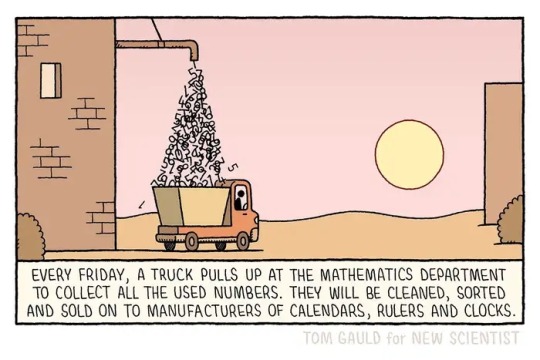
My latest cartoon for New Scientist
9K notes
·
View notes
Text
we gotta figure out the prescription bottle recycling thing man I get like 12 of them every month and it's an enormous amount of single use plastic that is going directly into landfills and the ocean. there's zero reason for pharmacies not to have empty bottle dropoffs, it's dry storage and easy to clean. one problem is plastic gets micro scratches and dings in it that make it difficult or impossible to sanitize to a medical standard, which would be solved by switching to glass bottles, but then glass causes transport problems with weight and fragility. I've researched this and the only way to recycle prescription bottles in my city is to, on your own, mail them somewhere that will do it for you. I think some of the privatized recycling services will do the same thing but I'm deeply suspicious of those services and suspect most of them are not actually recycling anything. the recycling infrastructure is so bad in the USA and the majority of our plastic recycling is not actually happening, it's just fake garbage sorting that ends up in landfills anyway. we HAVE to go back to using glass for everything, plastic recycling is a dead end.
2K notes
·
View notes
Text
I made some solarpunk soda tab jewelry!! Again. And I'm making more. (Image ID at the bottom of he post)
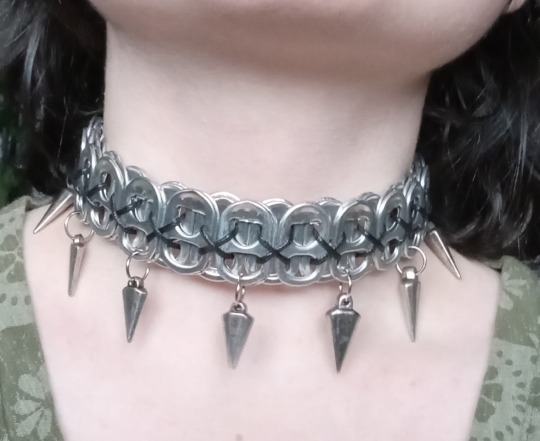
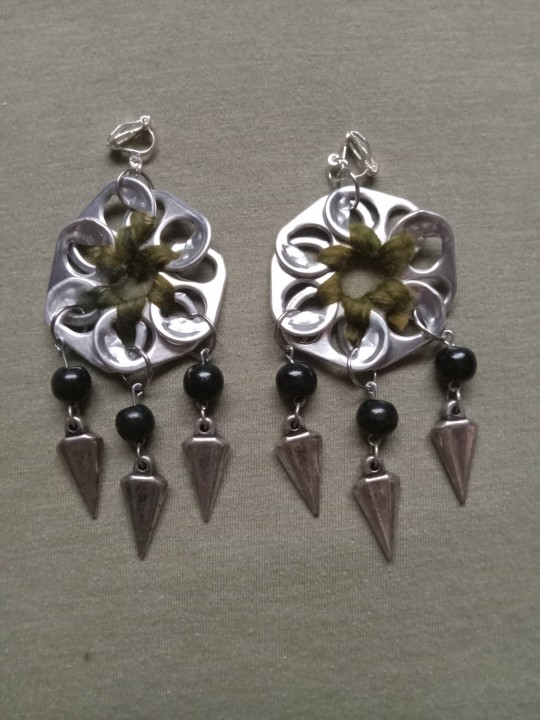
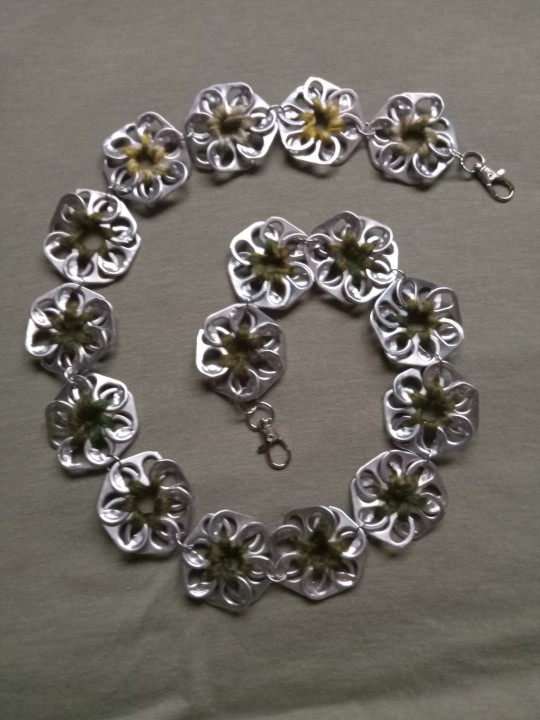
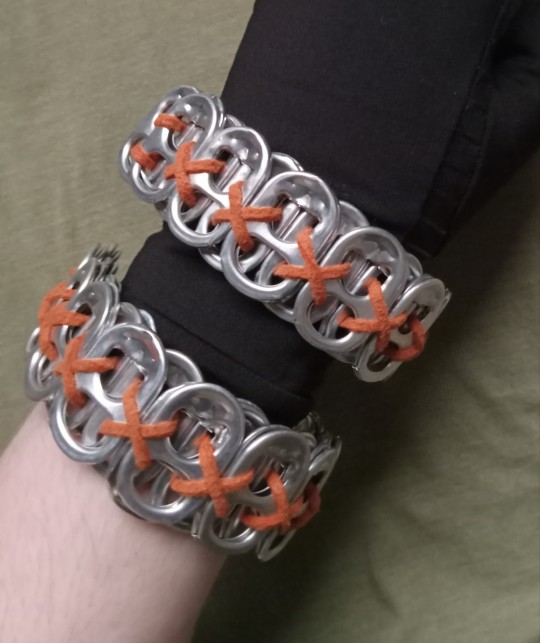
A choker, a pair of earrings, a belt/waist chain and some bracelets using 100% thrifted/recycled materials! The choker and the bracelets have two layers so that the sharp aluminum edges on the back of the tabs aren't making contact with skin, you can kinda see it in the pictures. Here are more pictures:
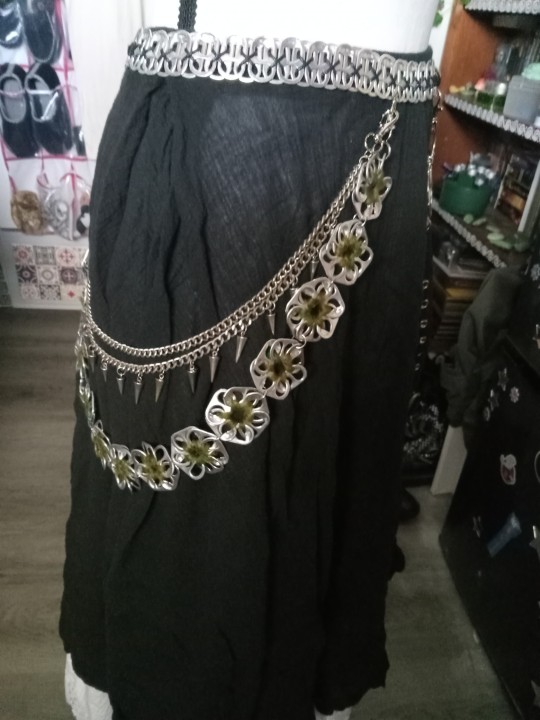
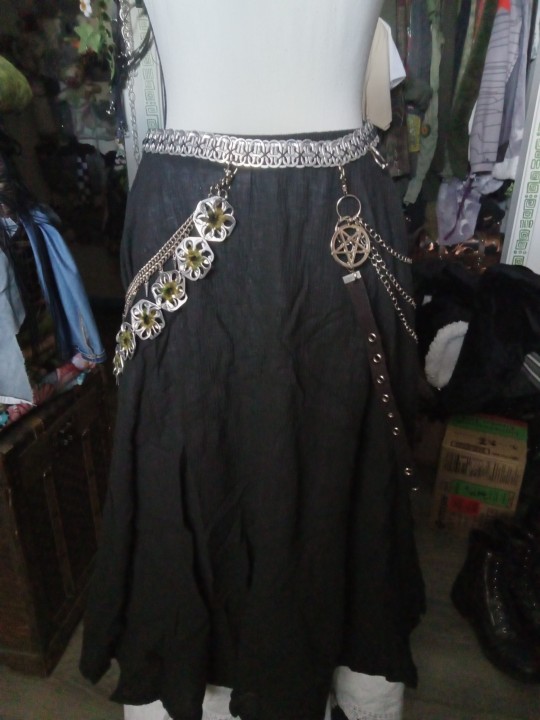
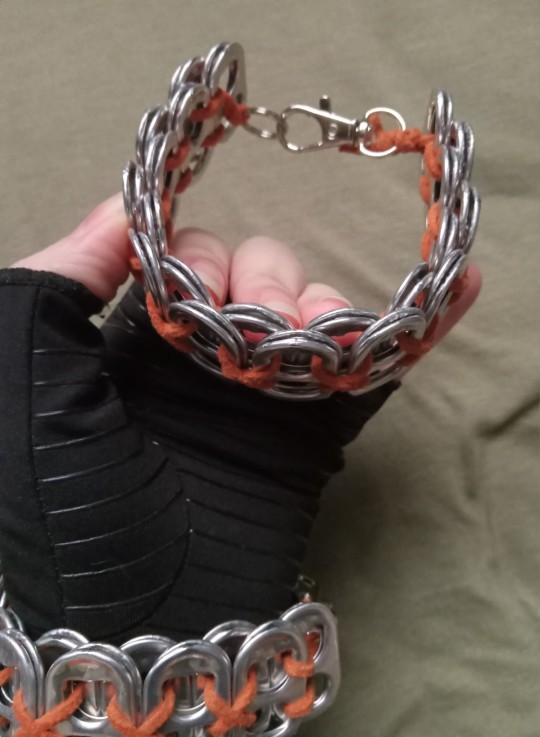
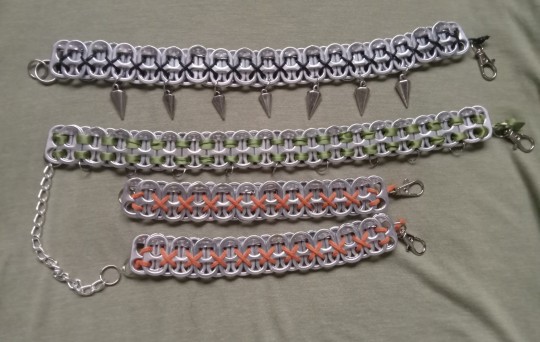
[Image ID: 8 images. The first one shows a choker made out of soda tabs, with black cord weaved through it forming x shapes. There's a silver spike charm hanging from every other tab about an inch apart from each other. Im in the picture wearing the choker, my face is not in frame but my pale as fuck neck is visible and so is my dark brown hair.
The second image shows a pair of clip-on earrings laying on a sage green background. Each earring is made of 6 soda tabs weaved into a flower shape with green yarn, and three dangles hanging from the bottom. The dangles are made of a wire link with a black bead on in and a silver spike charm hanging from that. The same spike charms I used for the choker.
The third image shows a 2 ft 7 inch long belt chain made of the soda tab flowers from the earring image. Each flower is made of six tabs weaved together with the same green yarn but they yarn fades to yellow towards the end of the chain. 16 soda tab flowers are linked together with large jump rings and there are large silver clasps on each end to attach to a belt.
The forth image is my hand wearing a black compression brace and two soda tab bracelets. They are weaved together the same way as the choker, with the cord forming x shapes, but the cord is orange and not black. The bracelets are the same size, 8 inches long when laying flat including the clasp. There are two layers of soda tabs which makes the bracelet a little thicker.
The next 2 images shows a dress form wearing the belt chain from two different angles. It had a black skirt with a soda tab belt, with various spikey chains hanging from it. There's a black strip of grommet tape hanging on the right side of the belt and my soda tab flower belt chain hanging on the left side.
The next image shows one of the bracelets at and angle so the double layers are visible, and the last image shows the bracelets, the choker, and an unfinished soda tab choker with green ribbon weaved through it all laying flat on a sage green background. End ID]
#solarpunk#punk#solarpunk fashion#solarpunk diy#punk diy#punk fashion#fashion#diy#jewelry#upcycled jewelry#jewelry making#handmade jewelry#hatchet makes stuff#punk jewelry#solarpunk aesthetic#hopepunk#ecopunk#recycling#sustainable fashion#sustainability#soda tabs#pop tabs#tabistry#art#crafting#goth diy#goth jewelry#goth#goth fashion#described
1K notes
·
View notes
Text

Use Old Plastic Grocery Bags To Crochet A Handsome & Practical Market Bag: 👉 https://buff.ly/3eM0xlh
34 notes
·
View notes
Text
The aluminium from the cans was very sharp so I had to be careful not to get a cut, but other than that it was pretty easy
Tiktok i just found with a hack on using the bottoms of old cans as the base for diy buttons. Make sure to cover the sharp edge with something!
#ive started using tiktok again as a lil treat#god its embarrassing when my ass comes on here and is like GUYS LOOK AT MY TIKTOKS#punk#diy#diy pins#buttons#pins#diy buttons#recycling#upcycling#accessories#handmade#diy punk#punk diy#diy or die
2K notes
·
View notes
Text
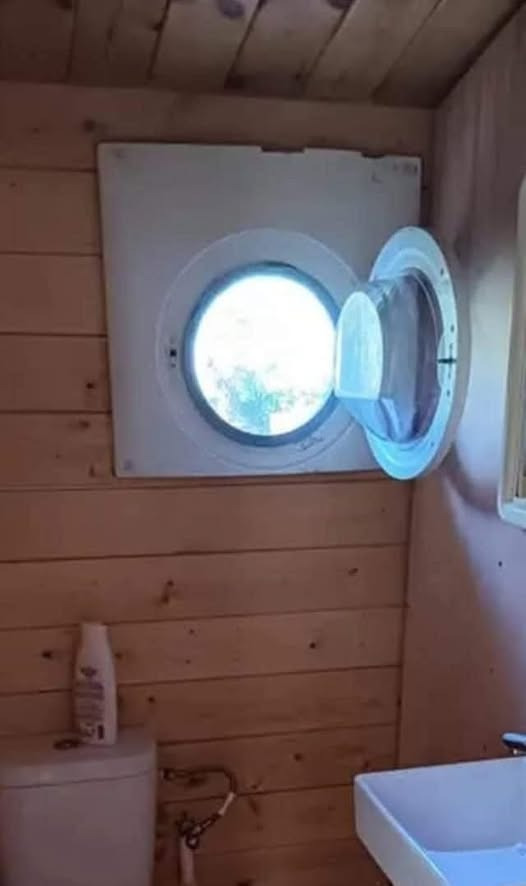
Reuse, recycle.
258 notes
·
View notes